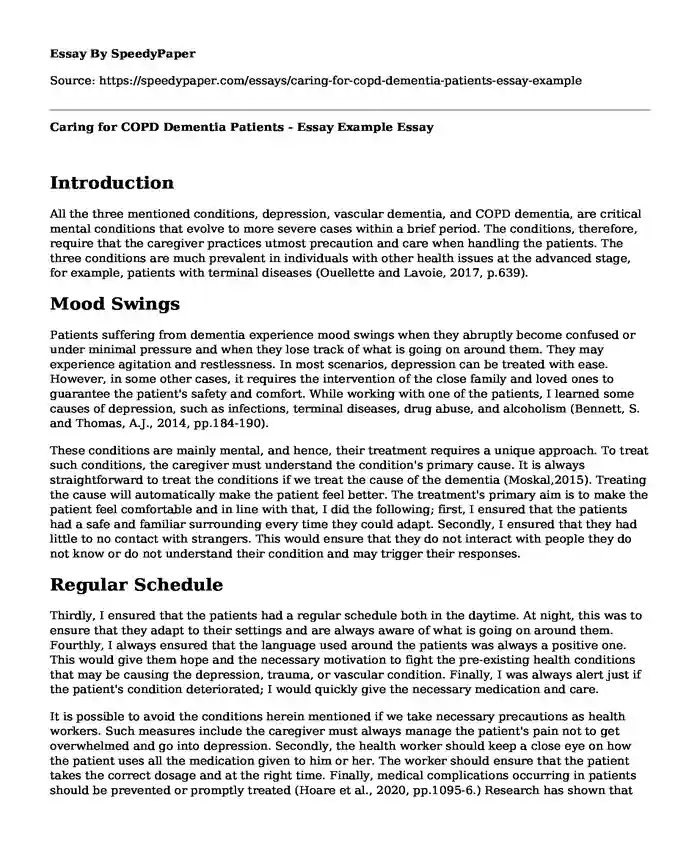
| Type of paper: | Essay |
| Categories: | Depression Dementia |
| Pages: | 3 |
| Wordcount: | 695 words |
Introduction
All the three mentioned conditions, depression, vascular dementia, and COPD dementia, are critical mental conditions that evolve to more severe cases within a brief period. The conditions, therefore, require that the caregiver practices utmost precaution and care when handling the patients. The three conditions are much prevalent in individuals with other health issues at the advanced stage, for example, patients with terminal diseases (Ouellette and Lavoie, 2017, p.639).
Mood Swings
Patients suffering from dementia experience mood swings when they abruptly become confused or under minimal pressure and when they lose track of what is going on around them. They may experience agitation and restlessness. In most scenarios, depression can be treated with ease. However, in some other cases, it requires the intervention of the close family and loved ones to guarantee the patient's safety and comfort. While working with one of the patients, I learned some causes of depression, such as infections, terminal diseases, drug abuse, and alcoholism (Bennett, S. and Thomas, A.J., 2014, pp.184-190).
These conditions are mainly mental, and hence, their treatment requires a unique approach. To treat such conditions, the caregiver must understand the condition's primary cause. It is always straightforward to treat the conditions if we treat the cause of the dementia (Moskal,2015). Treating the cause will automatically make the patient feel better. The treatment's primary aim is to make the patient feel comfortable and in line with that, I did the following; first, I ensured that the patients had a safe and familiar surrounding every time they could adapt. Secondly, I ensured that they had little to no contact with strangers. This would ensure that they do not interact with people they do not know or do not understand their condition and may trigger their responses.
Regular Schedule
Thirdly, I ensured that the patients had a regular schedule both in the daytime. At night, this was to ensure that they adapt to their settings and are always aware of what is going on around them. Fourthly, I always ensured that the language used around the patients was always a positive one. This would give them hope and the necessary motivation to fight the pre-existing health conditions that may be causing the depression, trauma, or vascular condition. Finally, I was always alert just if the patient's condition deteriorated; I would quickly give the necessary medication and care.
It is possible to avoid the conditions herein mentioned if we take necessary precautions as health workers. Such measures include the caregiver must always manage the patient's pain not to get overwhelmed and go into depression. Secondly, the health worker should keep a close eye on how the patient uses all the medication given to him or her. The worker should ensure that the patient takes the correct dosage and at the right time. Finally, medical complications occurring in patients should be prevented or promptly treated (Hoare et al., 2020, pp.1095-6.) Research has shown that some of these complications cause or worsen the conditions mentioned above (Fang et al., 2009, p.210).
Conclusion
In conclusion, providing care to the dementia patients comes with consequences to the caregivers and the family of the patient. With time, this category of people develop distress. Whereas proper attention should be paid to the patients, it is equally important that the children, spouses, and family of the patients also be given proper care. My advice to the caregivers of patients with depression, vascular, and COPD is that they find support groups or educational materials to help them during the challenging and stressful time.
References
Bennett, S. and Thomas, A., 2014. Depression and dementia: Cause, consequence or coincidence?. Maturitas, 79(2), pp.184-190.
Fong, T.G., Tulebaev, S.R. and Inouye, S.K., 2009. Delirium in elderly adults: diagnosis, prevention and treatment. Nature Reviews Neurology, 5(4), p.210.
Hoare, E., Callaly, E. and Berk, M., 2020. Can depression be prevented? If so, how?. JAMA psychiatry, 77(11), pp.1095-1096.
Moskal, J., Northwestern University, 2015. Methods of treating depression and other related diseases. U.S. Patent 9,149,501.
Ouellette, D.R. and Lavoie, K.L., 2017. Recognition, diagnosis, and treatment of cognitive and psychiatric disorders in patients with COPD. International journal of chronic obstructive pulmonary disease, 12, p.639.
Cite this page
Caring for COPD Dementia Patients - Essay Example. (2024, Jan 11). Retrieved from https://speedypaper.net/essays/caring-for-copd-dementia-patients-essay-example
Request Removal
If you are the original author of this essay and no longer wish to have it published on the SpeedyPaper website, please click below to request its removal:
- Free Essay: Case Study on Value of Health IT Investment
- The Non-Acceptance of Psychiatry in Saudi Arabia, Free Essay for Students
- Free Essay with the Patient's Evaluation Statement
- Presentation Paper Sample on Designing a Mental Health Needs Assessment Proposal
- Essay Example on Preventive Care Within the Health Unit
- Free Essay Example: Anorexia Nervosa
- Literary Analysis Essay on The Social Life of DNA
Popular categories




